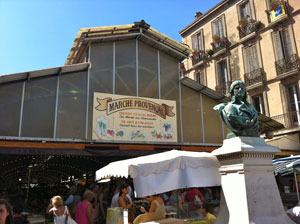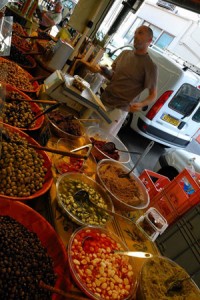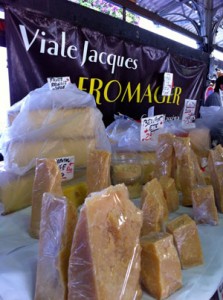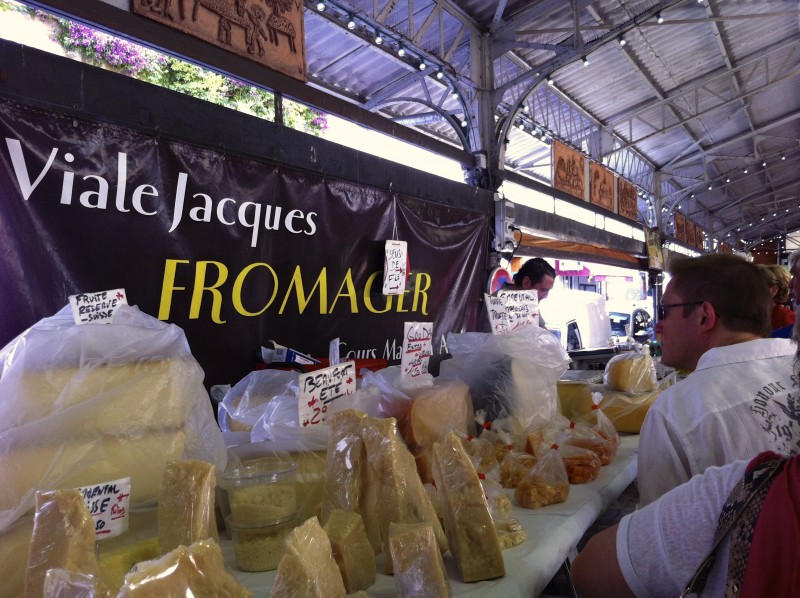I’ve been feeling a bit self-satisfied about my progress en français during these first few weeks back in the country.
The weekend of wine degustation in Bordeaux had to be the trigger. Enduring fact-laden discussion after discussion about winemaking techniques and les appreciations visuelle, olfactive and gustative – tout en français – gave my French a little swagger. I’d mastered the weekend without the usual headache – not from the wine, I mean, but from the endless hours thinking in a ridiculously intricate language.
The perfect finale of our degustation weekend came from the stewardess aboard the domestic Air France flight back to the Côte d’Azur. I’d asked for my jus de tomate, no glaçons, and then managed some joke that, whoops, asking her to hold the ice was so American of me! My words may not have been beautiful sounding, but they were all, each and every one of them, en français.
On leaving the aircraft the stewardess asked if I’d managed to understand her français-anglais.
Mais oui, bien sûr, I told her. Piece of cake. It was, in truth, hardly rocket science – just the usual instructions to fasten my ceinture de sécurité, and to pull the masque à oxygène toward me and breathe normalement rather than hyperventilate as the plane plummeted toward Earth.
My French-Canadian husband Philippe followed me out of the plane. The stewardess told him she wished she understood English as well as I did French.
It was a thrilling, new endorsement. An audible improvement in my language skills makes some sense. I’ve been speaking more French at home in Toronto this year. And I’ve hardly given up on that weekly class at Alliance Française. My accent will never match the sheer beauty of my eight-year old’s, mind you, but she started speaking French three decades earlier in her lifetime. Her tongue remains adaptable.
Now back in Antibes from Brittany and Bordeaux, we’re at last spending more time in our beloved summer hometown again. Life is returning to its ritual charms. Saturday morning I’m heading out on my bike to the daily Marché Provençal to pick up some essentials, but first I have to check out nail salons. Not for me – for my eight-year-old daughter and her ten-year-old cousin.
I’ve never appreciated how popular the nail salon is in Antibes. Cruising into town, I recall the hub for such vital services is Boulevard Albert 1er, the main thoroughfare between the shops at Place de Gaulle and the sandy beaches. Nail salons, hair salons, and real estate agencies. All these necessities are grouped together in their inexplicable proliferation along this particular stretch.
What I also haven’t realized on this Saturday, a couple weeks before the real season begins in the Côte d’Azur, is that services for les ongles are all booked up. On about the seventh go, I see two salons side-by-side at the bottom of Boulevard Albert 1er. The first being closed, I head into its neighbour, bike helmet still firmly fixed to my head. I remove my sunglasses. Two women hover over an older woman with wet hair seated in the styling chair near the door. They’re discussing her treatment.
Bonjour! I say. (Always start with a cheery bonjour. I mean always. It’s incredibly rude not to.)
Bonjour! Replies the small chorus, quite tunefully, as is the way.
I hear my voice rise a couple pitches to match theirs. Est-ce qu’il y a des rendez-vous disponibles cet après-midi? Are there any appointments available this afternoon?
Attendez… One of the standing women heads toward the reception desk to check the appointment book.
….pour les ongles? Des manicures ou des pedicures?
Non, nous ne faisons pas les ongles – c’est notre voisin qui fait les ongles. Not here, the woman at the reception desk says. Try next door.
A few meters away, the lady getting her hair done pipes up. They don’t do nails here, she tells me. You get your nails done next door.
Mais son magasin est fermé, I say to the receptionist. Her shop is closed.
Oui, the she says, elle va l’ouvrir à 10h30.
I look at my watch. Mais il est…. I start to explain it’s well past that hour when the client with wet hair again makes her contribution. The store next door will open at 10:30.
I’m suddenly confused. Is this woman with wet hair the employee of the neighbouring shop? On break at the moment to get her hair done?
Bien oui, il est presque 11h00! the receptionist says. Elle n’est pas loin, peut-être au coin de la rue….
Pas de soucis – no worries, I start, when the seated woman jumps in again. The neighbouring shop attendant isn’t far away, maybe just up the street.
I’ve been totally off kilter in this shop and finally I understand why. I look at the woman seated in the styling chair with the wet hair. Oui, je peux parler en français! I tell her. I can speak French!

Merci, I say to the receptionist on my way out the door. Je reviendrai après le marché. I’ll come back after going to the market. And then I’m off, cycling into the old town as my brain churns – in French – at the client’s idea that she needed to help me out. Et je n’ai jamais perdu un mot – un seul mot! I never lost a word – a single word!
Antibes’ Marché Provençal unfurls every morning in an old covered plaza just outside the medieval part of town. Merchants lay out their tables in three long rows under a metal roof, selling produce, meats and cheeses, olives, spices and flowers. On Saturdays the place is especially busy as merchants’ tables spill over the edges of the plaza and pedestrians slip into the streets. Today the zucchini flowers look especially beautiful at one vegetable stand – less wilted than usual as the temperatures remain nicely below seasonal. Local heirloom tomatoes feature at another stall. A man pulls hot soccas (chickpea pancakes) out of a clay oven at one end of the market while the dozen whole fish remaining on the neighbouring table seem to watch the throng with unblinking gazes.

The fromager at the center of the Marché Provençal has to be the best cheese merchant on the planet, and unfortunately I’m not alone in this opinion. I pick up the other items on my list – cherry tomatoes, cucumber, olives and pourpier (a leafy green my dictionary translates as “purslane,” for whatever that’s worth) – before joining the inevitable queue that forms beside Jacques Viale’s popular stall.
The woman in front of me strikes up conversation. Il y a toujours une file d’attente, she says. There’s always a queue.
Yes, I say, but the cheese is fantastic.
Hardly flummoxed by my foreigner’s French, this woman with blunt-cut salt and pepper hair continues. She blames her neighbour for the fact that she’s standing in today’s file.
We shuffle forward slowly past enormous hunks of parmigiano reggiano, comté, and vieux gruyère that line the top of the fromager’s counter space. This woman’s neighbour, I learn, highly recommended a particular specimen of blue. I can’t ascertain its exact whereabouts within the long, glass cases up ahead, but I do understand that the grocery store’s version of this cheese is pretty lousy.
Several minutes later the woman’s husband joins her in the queue. I shuttle my basket forward on the floor behind theirs so that now we’re parallel with the case of blue cheeses.

Ah, c’est celui-là? I ask the woman, pointing at the bleu de brebis that sounds similar to what she mentioned.
Non, non, she says and shifts my attention further along in the case. Her husband interrupts.
No, the looming and bespectacled man says to me in English, brebis is a sheep. This is not cheese from a vache, a cow.
Non, non, je comprends, I say. I understand, but…
The lecture continues. A vache is a cow. A brebis is a sheep. They are not the same thing (you moron). The man’s wife tries to cut in as he continues to underscore my stupidity. At last she prevails. The two of us were speaking earlier about a particular blue cheese, she explains.
The husband is unrepentant. Happily he’s still within earshot when I’m finally at the head of the growing queue, face to face with the broad-shouldered, thick-fingered fromager in his white t-shirt and apron. So I go local for the benefit of the unrepentant husband. Completely and unabashedly local. I make my selections from the famous Mr Viale with abundant competence.

Bonjour! I start cheerily (as scripted). A good slice of the vieux gruyère, s’il vous plaît – I bought it from you a couple weeks ago and it’s vraiment délicieux!
Avec ça, madame? The fromager always asks what else, with his usual, courteous smile.
And here’s the Cabris! It’s my chèvre (goat’s cheese) préférée!
Avec ça, madame?
I choose a virtually obligatory block of (Italian) parmigiano reggiano. Yours is the best in the world! I tell him.
Avec ça, madame?
The final thing, a half-round of livarot.
This choice delights the fromager, though unfortunately my unrepentant lecturer has moved on and is missing this bit of our conversation. Buying livarot has to be the most local thing I’ve done in a good while. Tasting it has been on my “to-do” list, simply for curiosity’s sake, for probably six or seven years – since the time I read that livarot was the smelliest of all smelly French cheeses. Today seems as good a day as any. A much better one, in fact.
Back at Bellevue, the girls are delighted to learn that I’ve found two last-minute rendez-vous for them and their ongles. Philippe’s equally thrilled by my cheese selections, especially the livarot. He’s equally receptive to learning about my personal encounters at the salon and the marché. He reflects for a moment on my interactions with the locals.
Your vocabulary is really good, he tells me. He’s obviously trying to encourage.
But your accent, he continues. That’s the problem. With an accent like that, no one thinks you understand a single word they’re saying!

